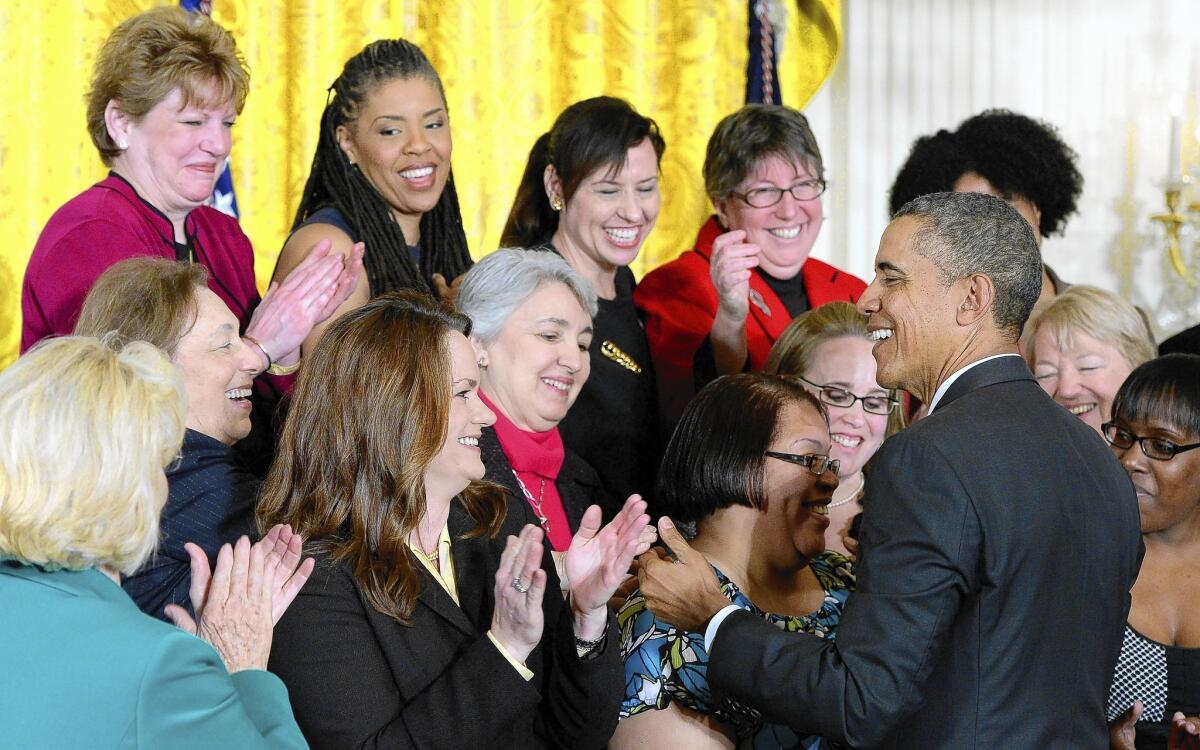U.S. tells Iran its choice for U.N. ambassador is ‘not viable’

- Share via
WASHINGTON — The White House stepped up its opposition Tuesday to Iran’s choice for ambassador to the United Nations, but sought to keep the controversy from derailing negotiations over the Islamic Republic’s disputed nuclear program.
Hamid Aboutalebi, Iran’s selection as envoy to the U.N., has drawn sharp criticism in the United States because he belonged to a student group that seized the U.S. Embassy in Tehran and took American diplomats hostage during the 1979 Islamic Revolution.
The Senate voted unanimously Monday evening to bar Aboutalebi from entering the United States. The House is expected to follow suit.
The Obama administration, eager to avoid disruption of the international nuclear negotiations with Iran that resumed Tuesday in Vienna, has called Aboutalebi’s selection “extremely troubling,” but it stopped short of barring his entry.
White House Press Secretary Jay Carney toughened up his language, however, saying U.S. officials have told Iran that the Aboutalebi selection is “not viable.”
Though Iranian officials have called the appointment definitive, Carney described it as a “potential selection, as I understand it, that has not been formally made.”
“The legislation passed by the Senate underscores just how troubling this potential nomination would be,” he said.
Officials said they had not ruled out denying Aboutalebi a visa but that they hoped Iran would pick a new nominee so that wouldn’t be necessary.
The U.S. government has the prerogative to reject ambassadorial candidates to serve at the U.N. headquarters in New York, though it is rarely exercised.
Aboutalebi, 57, a pro-reform diplomat aligned with President Hassan Rouhani’s circle, has held a series of posts around the world, including in Australia, Italy and Belgium. He is considered liberal and pragmatic, and is well-known to American specialists on Iran.
He has played down his role in the 1979 hostage-taking, saying he served in the group primarily as an interpreter. He was a 22-year-old student at the time.
But the students’ seizure of the U.S. Embassy and its diplomats remains a scar on U.S.-Iranian relations.
Some Iran analysts were surprised that Rouhani apparently failed to anticipate that Aboutalebi would galvanize strong U.S. opposition.
“This was just a blooper,” said Cliff Kupchan, an Iran specialist at the Eurasia Group risk-consulting firm. He said the government in Tehran, which still resents the CIA-engineered ouster of Iran’s prime minister in 1953, should have recognized the sensitivity of sending a diplomat who played a role in the hostage-taking.
The nuclear talks, which are aimed at sealing a deal to prevent Iran from gaining the ability to build a nuclear weapon, have made progress since they resumed in February, negotiators say. But hard-liners in Iran and the United States are strongly suspicious of a potential accord, and critics could try to use the dispute over Aboutalebi to undermine the talks.
In Vienna on Tuesday night, U.S. and Iranian officials held a 90-minute meeting separate from the seven-country talks that are underway.
The bilateral session was “useful and professional,” said a senior State Department official, who declined to be identified when speaking about the sensitive subject.
Special correspondent Ramin Mostaghim in Tehran contributed to this report.
More to Read
Sign up for Essential California
The most important California stories and recommendations in your inbox every morning.
You may occasionally receive promotional content from the Los Angeles Times.












